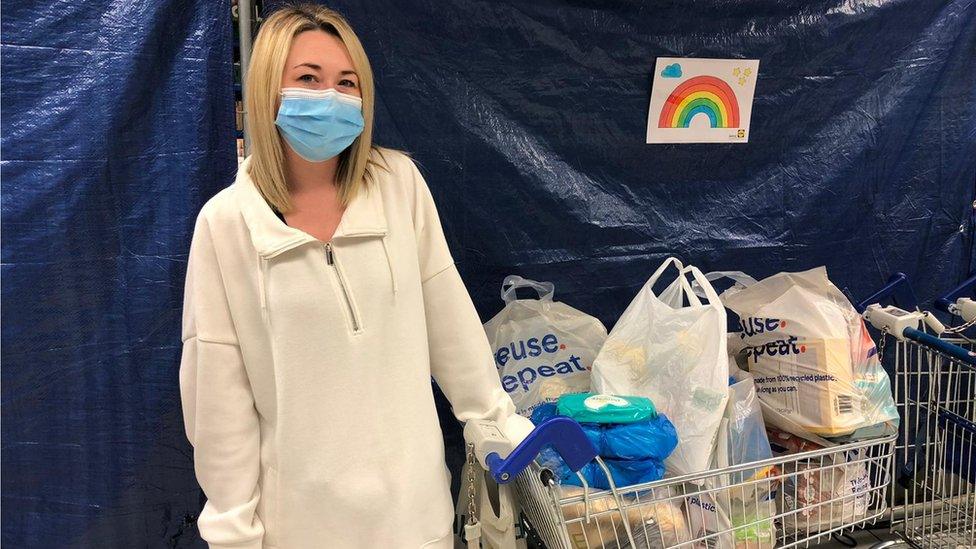Cambridge co-farming: 'Rethinking how we do food'
- Published
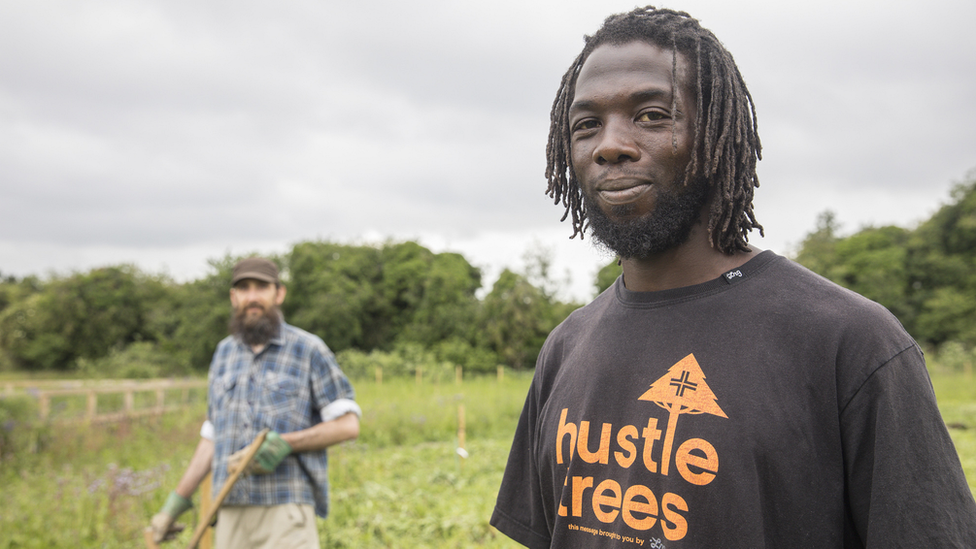
More than 300 local volunteers have helped grow the food since the co-farm was created in 2019
An organic city garden set up in 2019 has donated more than 10 tonnes of freshly-grown produce to community food hubs during the pandemic.
CoFarm Cambridge was created, external to "rethink" climate change, biodiversity loss and health inequalities. It has attracted more than 300 volunteers who farm the seven acre (three hectare) former field in the north of the city. BBC News has been finding out more about the project.
'Be part of something bigger'
"If you told me at the start of the year I'd be doing what I'm doing at the moment, I'd have laughed at you," said James Dore.
The 32-year-old moved to Cambridge to begin a clinical psychology degree in 2019, while working in a nightclub to fund his studies.
When the pandemic struck he was furloughed twice and spotted some "great fresh veg" grown by the co-farm - short for community farm - as he picked up supplies at a food bank.
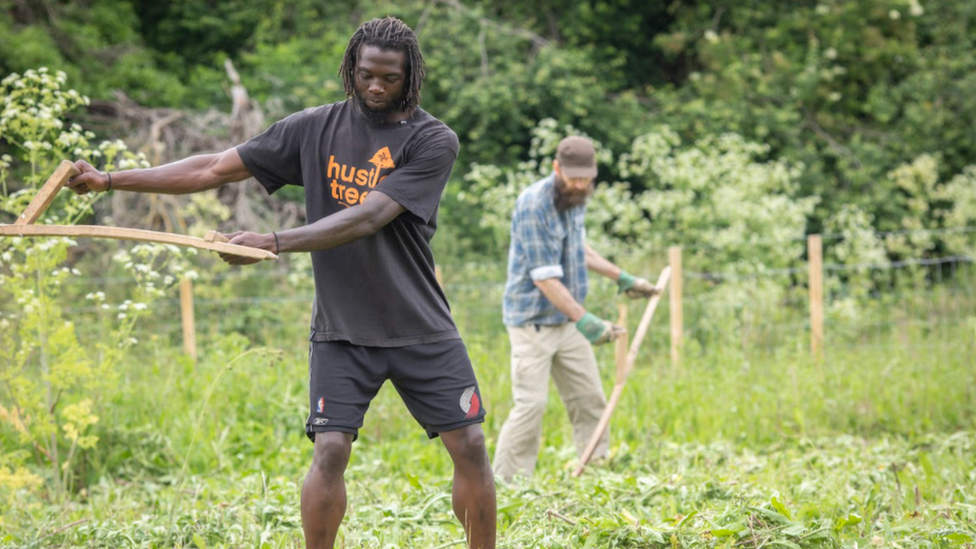
The gardening skills James Dore has learned since he began volunteering has led him to a career in horticulture
"My degree had gone online so I stopped that, my flat didn't have a garden and I needed to get strength back in my body after being badly beaten two years earlier - so in February I began volunteering at the farm," he said.
Mr Dore has been astonished at what he has learned since, including "the taxonomy of the botanical names of the flowers, horticulture, permaculture, looking after the soil and composting".
"Pivotal" to his experience are the farm's horticulturalists, Peter Wrapson and Dominic Walsh.
He credits their teaching with helping him develop a new career as a freelance gardener.
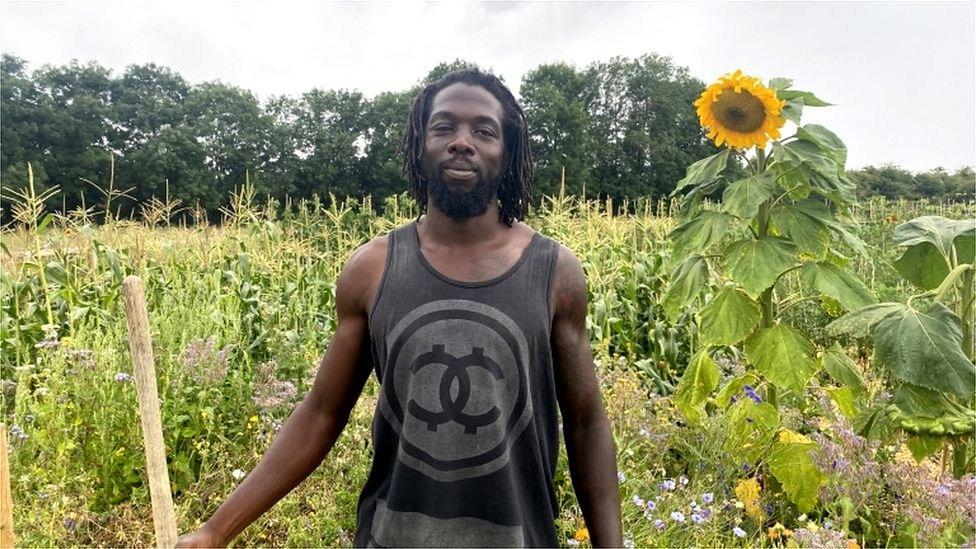
Mr Dore says it is great to be "part of something bigger than yourself"
Mr Dore said: "I'm now earning and have some savings and this is going to be my career - I'll be doing horticulture courses next.
"Mainly for me, it's just work and get strength back into your body and to be a part of something bigger than yourself."
'It's a real eye-opener'
Fellow volunteer Alex Bright, 45, said: "To not know where your next meal comes from, I can't imagine how that feels, it must be frightening.
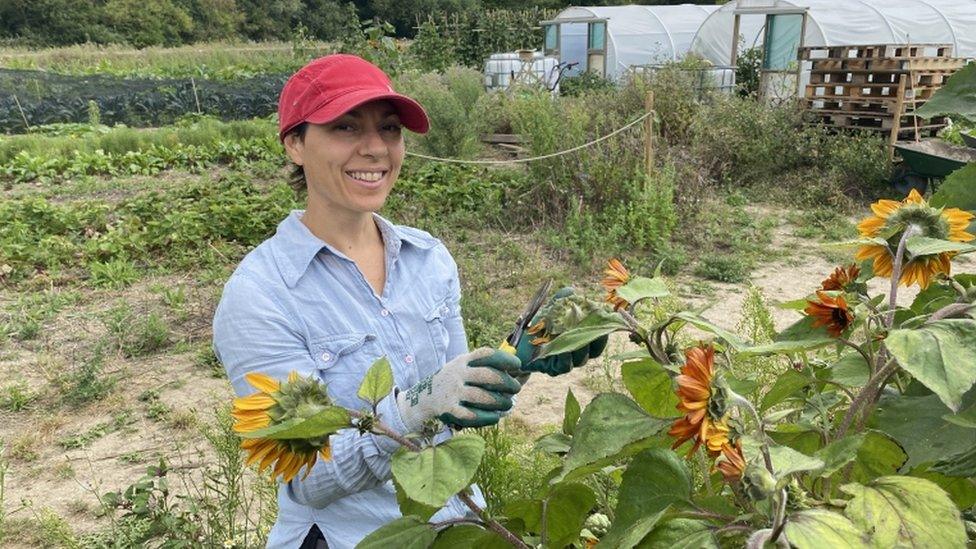
Alex Bright says the farm takes advantage of natural predators instead of using pesticides on crops
"So it is great to be able to be involved in this and knowing this fresh wholesome food is doing some good in the local community."
The former IT business systems manager lives locally and spotted posters about the project on one of her regular dog walks past the site.
She signed up as a volunteer and her first task was to help dig a trench for the farm's rabbit-proof fence.
"Since then, I've clocked up more than 400 hours, mostly evenings and weekends as I was working full-time until June - when I gave up my job of 25 years to become a gardener," she said.
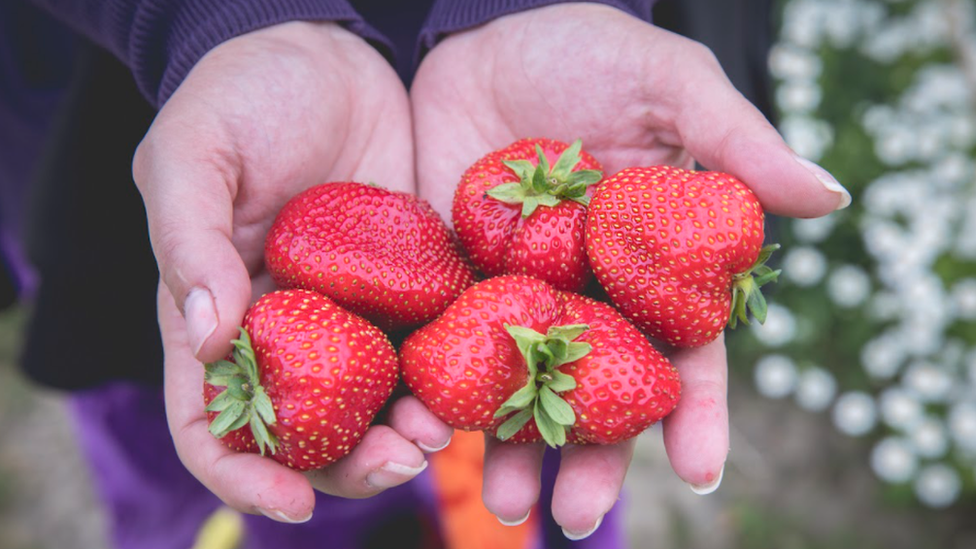
And she has been impressed by the results
Ms Bright was already contemplating the career move, but volunteering at the co-farm "cemented" the decision.
She has just started training through the Work and Retrain as a Gardener Scheme (WRAG), external, which provides paid, practical horticultural training.
For her, the "real eye-opener" of the farm is that "beautiful, really good quality" crops can be grown without using machinery or pesticides.
"We're taking advantage of the natural predators and encouraging those beneficial insects to the farm by planting the right kind of flowers that they will feed on."
'Our food travels in metres, not miles'
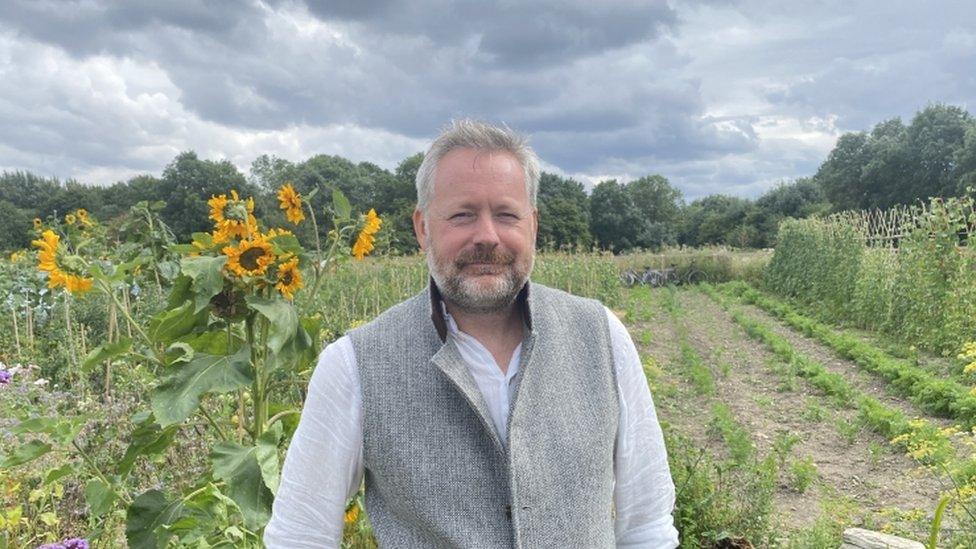
CoFarm founder Gavin Shelton spent most of his career in biodiversity conservation
The city garden was the idea of Gavin Shelton, who wanted to tackle climate change, biodiversity loss and health inequalities in society.
"Just by rethinking how we do food, you can tackle all those issues," he said.
The charitable start-up grows cover crops to improve soil structure, adds plants to attract pollinators and works with local farmers, researchers and conservation groups.
Mr Shelton, 48, said: "But the really important thing about co-farming is it has to involve local people in the co-creation of their own farm."
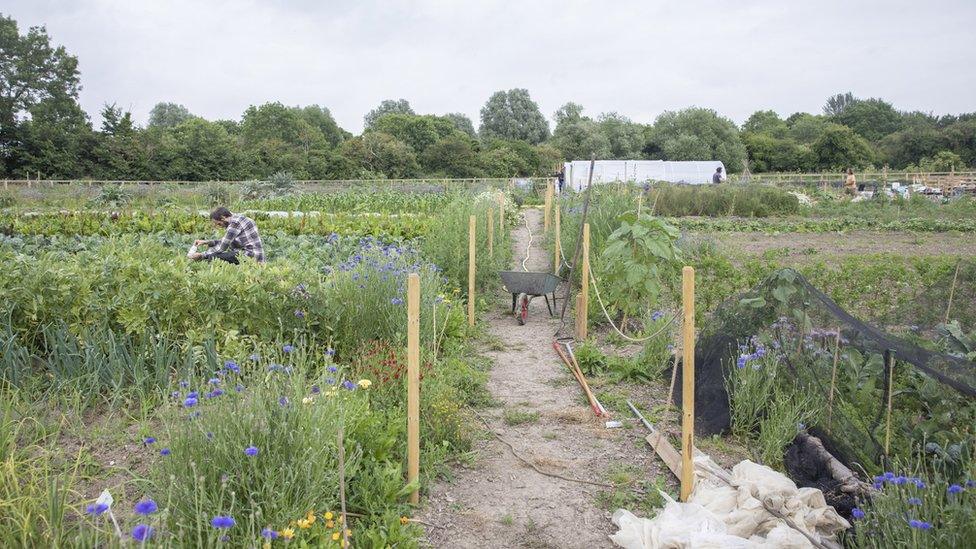
The site had to be cleared and fenced in before the first crops could be planted
As a result, about 300 people from the city's Abbey ward - where the farm is based - were involved in shaping its design in 2019.
The site had to be cleared and fenced and the pandemic slowed things down, so planting did not start until June 2020.
Yet "we produced four-and-a-half tonnes of produce from the site last year", he said, which was donated to nine community food hubs across Cambridge. He expects to have doubled that by the end of this year's growing season.
Mr Shelton said: "The distance that food has travelled has been measured in metres, not miles, and that's one way of cutting down on the carbon budget."
Cambridge CoFarm has received support from the Food, Farming and Countryside Commission, external, which aims to make UK farming more sustainable while increasing access to healthy, affordable food for all.
Alice Midmer, Cambridgeshire co-ordinator for the commission, said "co-farms are a fantastic example" of how it is possible to reshape food systems from both "environmental health and human health" perspectives.
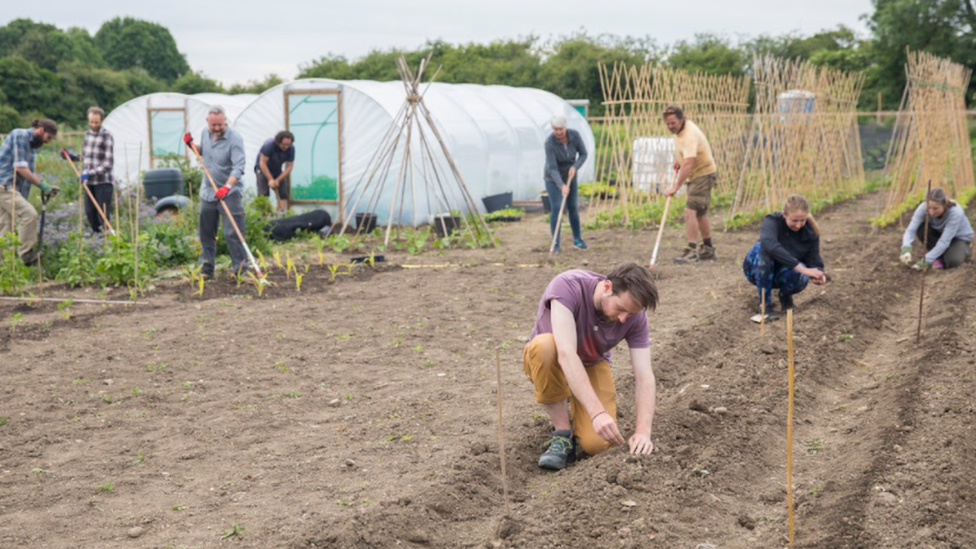
Mr Shelton hopes other parts of the country will also develop co-farms

Find BBC News: East of England on Facebook, external, Instagram, external and Twitter, external. If you have a story suggestion please email eastofenglandnews@bbc.co.uk, external
Related topics
- Published11 June 2021
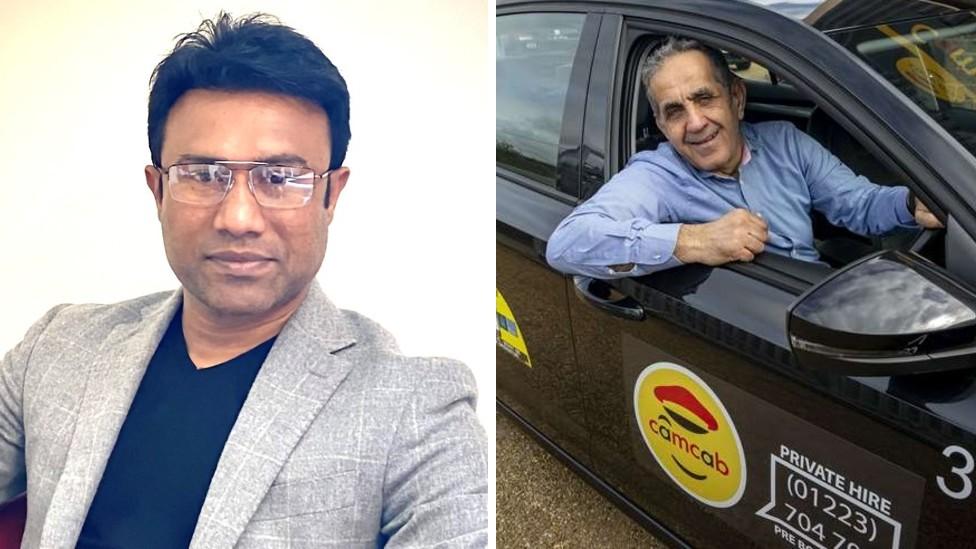
- Published22 February 2021
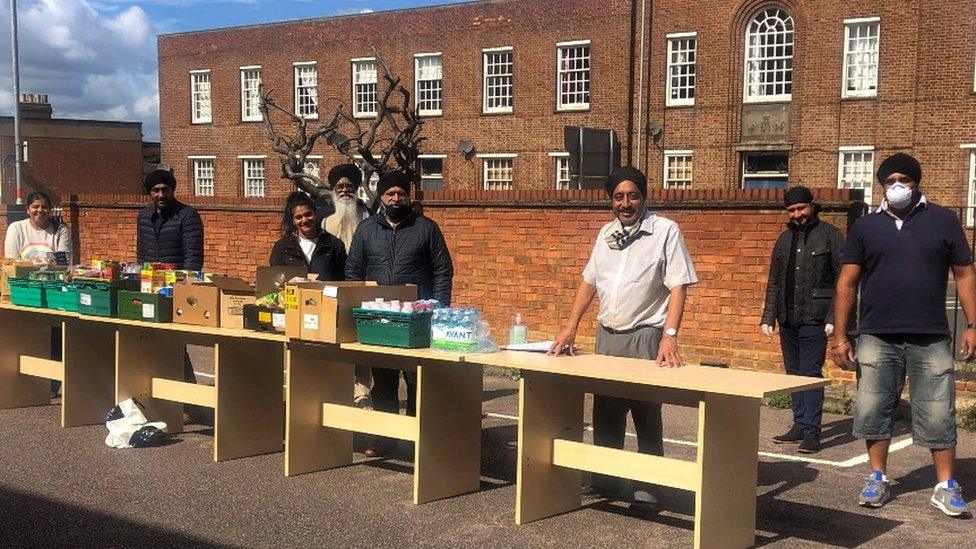
- Published22 July 2020
